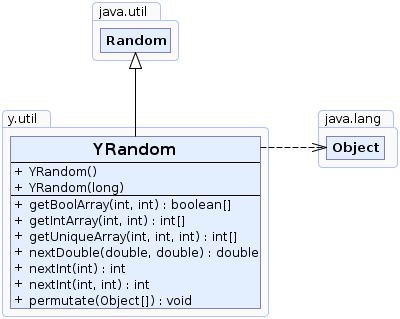 java.util.Random
java.util.Random
 y.util.YRandom
y.util.YRandom
|
Search this API | ||||||||
| PREV CLASS NEXT CLASS | FRAMES NO FRAMES | ||||||||
| SUMMARY: NESTED | FIELD | CONSTR | METHOD | DETAIL: FIELD | CONSTR | METHOD | ||||||||
java.lang.Objectjava.util.Random
y.util.YRandom
public class YRandom
Generates pseudo-random numbers and the such.

| Constructor Summary | |
|---|---|
YRandom()
Creates a new instance of this class. |
|
YRandom(long seed)
Creates a new instance of this class with a given initial random seed. |
|
| Method Summary | |
|---|---|
boolean[] |
getBoolArray(int n,
int trueCount)
Returns an array of n randomly chosen boolean values
of which trueCount of them are true. |
int[] |
getIntArray(int bucketCount,
int ballCount)
Returns an int array of length bucketCount for
which the values of all fields are non-negative and sum up
to ballCount. |
int[] |
getUniqueArray(int n,
int min,
int max)
Returns an array of n unique random integers that
lie within the range min (inclusive) and
max (exclusive). |
double |
nextDouble(double minValue,
double maxValue)
Returns a double with a random value between minValue
(inclusive) and maxValue (exclusive). |
int |
nextInt(int n)
Returns a pseudo-random, uniformly distributed int value between 0 (inclusive) and the specified value (exclusive), drawn from this random number generator's sequence. |
int |
nextInt(int minValue,
int maxValue)
Returns an int with a random value between minValue
(inclusive) and maxValue (exclusive). |
void |
permutate(java.lang.Object[] a)
Permutes the positions of the elements within the given array. |
| Methods inherited from class java.util.Random |
|---|
next, nextBoolean, nextBytes, nextDouble, nextFloat, nextGaussian, nextInt, nextLong, setSeed |
| Methods inherited from class java.lang.Object |
|---|
clone, equals, finalize, getClass, hashCode, notify, notifyAll, toString, wait, wait, wait |
| Constructor Detail |
|---|
public YRandom()
public YRandom(long seed)
| Method Detail |
|---|
public int nextInt(int n)
nextInt in class java.util.Random
public int[] getUniqueArray(int n,
int min,
int max)
n unique random integers that
lie within the range min (inclusive) and
max (exclusive). If max - min < n
then null is returned.
public boolean[] getBoolArray(int n,
int trueCount)
n randomly chosen boolean values
of which trueCount of them are true.
If the requested numbers of true values is bigger than the number
of requested boolean values, an Exception is raised.
public int[] getIntArray(int bucketCount,
int ballCount)
bucketCount for
which the values of all fields are non-negative and sum up
to ballCount. The values are put
in the array randomly.
public double nextDouble(double minValue,
double maxValue)
minValue
(inclusive) and maxValue (exclusive).
maxValue > minValue
public int nextInt(int minValue,
int maxValue)
minValue
(inclusive) and maxValue (exclusive).
maxValue > minValuepublic void permutate(java.lang.Object[] a)
|
© Copyright 2000-2025, yWorks GmbH. All rights reserved. |
||||||||
| PREV CLASS NEXT CLASS | FRAMES NO FRAMES | ||||||||
| SUMMARY: NESTED | FIELD | CONSTR | METHOD | DETAIL: FIELD | CONSTR | METHOD | ||||||||